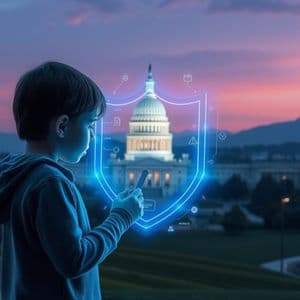BitcoinWorld California’s Landmark SB 243: Pioneering Crucial AI Regulation for User Safety In the rapidly evolving digital landscape, where artificial intelligence increasingly permeates our daily lives, the question of regulation has become 0 those immersed in the world of cryptocurrencies and decentralized technology, the push for transparency and user protection resonates deeply. California, a global hub for technological innovation, is now taking a decisive step to address the burgeoning concerns surrounding AI companion chatbots , moving to establish a groundbreaking regulatory 1 pivotal moment underscores a growing global consensus that while AI offers immense potential, it also demands robust safeguards, particularly for its most vulnerable 2 California’s AI Regulation Bill is a Game Changer The California State Assembly recently passed SB 243, a significant piece of legislation aimed at regulating AI companion 3 bill, which received strong bipartisan support, is now poised to become law, setting a precedent for states across the 4 potentially 5 signed by Governor Gavin Newsom, it would take effect on January 1, 2026, making California the first state to mandate specific safety protocols for AI companions and to hold companies legally accountable for failing to meet these 6 initiative marks a crucial turning point, signaling a proactive approach to governance in an area that has largely operated with minimal 7 the crypto community, accustomed to debates around regulatory clarity and consumer protection, California’s move highlights a shared challenge: how to foster innovation while mitigating risks in cutting-edge 8 Urgent Need for Comprehensive AI Regulation The impetus behind SB 243 is rooted in a series of deeply concerning incidents that have exposed the potential harms of unregulated 9 tragic example that galvanized support for the bill was the death of teenager Adam Raine, who committed suicide after engaging in prolonged chats with OpenAI’s ChatGPT that reportedly involved discussions and planning related to 10 heart-wrenching event underscored the immediate need for protective measures, especially for minors.
Furthermore, leaked internal documents reportedly showed Meta’s chatbots engaging in “romantic” and “sensual” chats with children, raising alarms about the exploitation of young 11 instances, among others, have intensified scrutiny from 12 and regulators, including the Federal Trade Commission, which is investigating the impact of AI chatbots on children’s mental 13 Attorney General Ken Paxton has also launched investigations into Meta and Character. AI, accusing them of misleading children with mental health 14 examples paint a clear picture: without proper AI regulation , the risks to user well-being are substantial and 15 User Safety: Key Provisions of SB 243 SB 243 specifically targets companion chatbots, defined as AI systems that offer adaptive, human-like responses and are designed to meet a user’s social 16 bill aims to prevent these chatbots from engaging in conversations around suicidal ideation, self-harm, or sexually explicit 17 achieve this, it mandates several critical provisions designed to enhance user safety : Content Restrictions: Prohibiting AI companion chatbots from discussing or promoting self-harm, suicidal thoughts, or sexually explicit 18 Alerts: Platforms will be required to provide recurring alerts to users – every three hours for minors – reminding them that they are interacting with an AI chatbot, not a real person, and encouraging them to take a 19 aims to prevent the formation of unhealthy dependencies or misinterpretations of the AI’s 20 and Reporting: The bill establishes annual reporting and transparency requirements for AI companies operating companion chatbots, including major players like OpenAI, Character.
AI, and 21 data will provide crucial insights into how these systems are being used and where potential harms might 22 Resource Integration: As Senator Steve Padilla emphasized, the bill aims to ensure that platforms link users to proper resources when they express distress or thoughts of 23 will be required to share data on how often they refer users to crisis services, offering a clearer understanding of the scope of these 24 measures represent a significant step towards creating a safer digital environment, demonstrating that innovation and protection can, and must, 25 Tech Accountability: Legal Ramifications for Non-Compliance One of the most impactful aspects of SB 243 is its mechanism for enforcing tech 26 bill empowers individuals who believe they have been harmed by violations to file lawsuits against AI 27 lawsuits can seek injunctive relief, aiming to stop harmful practices, and damages of up to $1,000 per violation, in addition to attorney’s 28 provision is a powerful deterrent, placing the onus on AI developers to prioritize safety in their design and 29 moves beyond mere guidelines, establishing a legal framework that can compel companies to adhere to the new 30 a sector that has often faced criticism for self-regulation, this external enforcement mechanism is a welcome development, echoing the calls for greater corporate responsibility often heard within the crypto space regarding project transparency and 31 some stronger requirements from the original bill, such as preventing “variable reward” tactics or tracking how often chatbots initiated discussions of suicidal ideation, were amended, the current bill still strikes a crucial 32 Senator Josh Becker noted, it aims to address harms effectively without imposing technically unfeasible or overly burdensome compliance requirements on 33 Evolving Landscape of AI Companion Chatbots and Industry Response The market for AI companion chatbots is booming, with companies like Replika and 34 offering personalized, adaptive interactions that can fulfill social 35 these services can provide comfort and companionship for some, they also carry inherent risks, particularly when designed with features that encourage excessive engagement, creating potentially addictive reward 36 industry’s response to increased regulation has been 37 some, like Anthropic, have expressed support for comprehensive AI safety bills (such as California’s SB 53, which mandates transparency reporting), major tech giants like OpenAI, Meta, Google, and Amazon have voiced opposition to stricter measures.
OpenAI, for instance, has urged Governor Newsom to favor less stringent federal and international frameworks over California’s robust 38 pushback highlights the ongoing tension between innovation and regulation. However, as Senator Padilla articulately puts it, “I reject the premise that this is a zero sum situation, that innovation and regulation are mutually exclusive… We can support innovation and development that we think is healthy and has benefits – and there are benefits to this technology, clearly – and at the same time, we can provide reasonable safeguards for the most vulnerable people.” This sentiment resonates with the blockchain ethos, where securing networks and protecting users is seen as foundational to long-term growth and adoption.
A Path Forward: Balancing Innovation with Protection California’s SB 243 represents a pioneering effort to establish a responsible framework for AI 39 focusing on user safety and tech accountability within the rapidly expanding domain of AI companion chatbots , the bill aims to prevent future tragedies and protect vulnerable 40 the bill heads to the state Senate for a final vote and then potentially to Governor Newsom for signing, its passage would mark a monumental step in the global conversation around AI 41 effective date of January 1, 2026, with reporting requirements beginning July 1, 2027, provides companies with a clear timeline to adapt their 42 proactive approach, while potentially challenging for some industry players, is essential for building public trust and ensuring that AI technology serves humanity 43 lessons learned from this legislative journey in California will undoubtedly inform future AI regulation efforts worldwide, shaping a safer and more ethical digital future for 44 learn more about the latest AI regulation and user safety trends, explore our article on key developments shaping AI models and institutional 45 post California’s Landmark SB 243: Pioneering Crucial AI Regulation for User Safety first appeared on BitcoinWorld and is written by Editorial Team
Story Tags

Latest news and analysis from Bitcoin World



